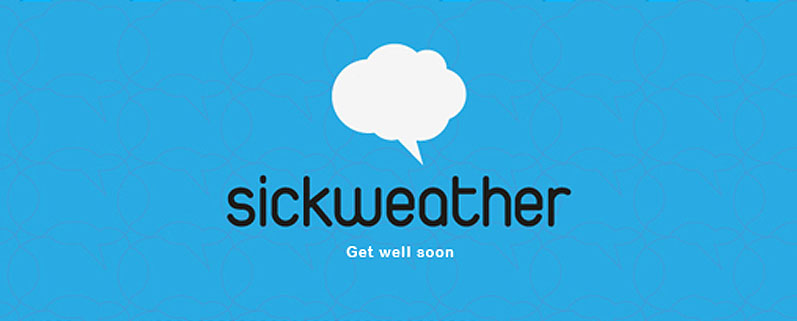If Baltimore is looking for a regional distinction, healthcare innovation ought to be near the top of the list.
So is there a better hometown than Baltimore for Sickweather to grow as an innovation-based technology startup? Outside of investment, the trio behind the sickness trend watching site say this is the right place for them to be.
Last fall, cofounders Graham Dodge (CEO, above at right), James Sajor (COO, above at left) and Michael Belt (CTO, above in center) were getting ready to unveil their much hyped tool. Now, their team is trying to transition their effort into a growth company, while bearing the weight of wanting to be one of the region’s strongest consumer startups — and doing big things like tracking sickness around February’s Super Bowl.
Sickweather, founded officially in November 2011 and currently working out of eccentric space on Cockeysville’s York Road, is billed as a “real-time sickness forecasting and mapping service.” The service taps chatter on social media about who has come down with any one of a number of common illnesses – and then maps these conditions (or outbreaks) via an easy to use interactive map.
There’s practical utility (wash your hands more because there’s a flu going around in Fells Point) and a potential greater power (tracking region-wide health concerns).
Before they too quickly change disease control, the team is planning on landing an iPhone app in September — a few revisions pushed it back from an earlier timeline — and working on finalizing their first fundraising round.
“The ink’s not dry, so we are still bootstrapped as of today,” said Dodge in an email, adding that they are now represented by Jeff Lehrer and John Hurley at DLA Piper and entered in their Venture Pipeline program.
It might help that Sickweather cofounders have a long past of working together. All three founders attended Dulaney High School in nearby Timonium and, in addition to collaborating on launching Sickweather, are all working musicians in various bands.
Prime users of Sickweather include parents with young children (think of the elementary school germ factory), business travelers who may want to know if there’s a stomach virus outbreak in their destination region, as well as the elderly – many of whom may have weak immune systems and would need to steer clear of areas showing illness outbreaks.
Dodge says the idea behind Sickweather came about from his work in the 1990s building a site that mapped crime census data.
“It was this project that provided the early kernels that took root around Sickweather. Much later in fact, I got sick with stomach virus and I remember looking on Facebook to see if anyone else was sick – and I remember seeing our art director, Nick Pimintel, showing on Facebook that he had the same symptoms down in D.C. It pushed me to do something around this to help others.
Watch a video interview with Dodge from MDBizNews.
http://www.youtube.com/v/0pAypGXAjsM?version=3&hl=en_US&rel=0
Dodge and his cofounders are hard at work generating early-stage investment in their company while vigorously adding new functionality. One new feature they’re working on is a “health chart” whereby users creates personal accounts that log their health social media submissions and then tracks their health ups and downs over time. Armed with this data, users can deploy better preventive measures to stave off sickness.
Revenue model possibilities include services like deep data dives and even targeted advertising for, say, cold medicine.
Dodge says over the next five years he’d like to see Sickweather become a solid growth company in Baltimore, adding between “50 and 100” local jobs. In addition to Baltimore’s longtime history of medical innovation, Dodge easily labels Baltimore a “thriving startup community.”
Mike Belt, who oversees the technology behind Sickweather, lauds Baltimore as “a great startup community of programmers — it’s a thriving scene of peers and peer support.”
Reminiscing on their launch less than a year ago, Dodge and Belt recall racing to finish the product for launch ahead of its press release hard send date. Once everything checked out as ready, Dodge says he’s saved one of his own Sickweather tweets that said “Best news heard all day, two words from our CTO: ‘It works!’”
Join the conversation!
Find news, events, jobs and people who share your interests on Technical.ly's open community Slack

Baltimore daily roundup: Mayoral candidates talk tech and biz; a guide to greentech vocabulary; a Dutch delegation's visit

Baltimore daily roundup: Medtech made in Baltimore; Sen. Sanders visits Morgan State; Humane Ai review debate

Baltimore daily roundup: An HBCU innovation champion's journey; Sen. Sanders visits Morgan State; Humane Ai review debate


